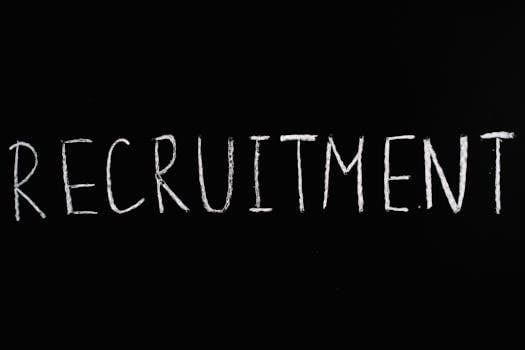The Evolving Talent Acquisition Landscape
The talent acquisition landscape is facing a multitude of challenges‚ including a shortage of skilled candidates and high competition for talent. Lean budgets and evolving candidate expectations also pose significant hurdles for recruiters.
Challenges in the Modern Recruitment Process
Modern recruitment processes are plagued by several challenges. The fluctuating job market and shifting candidate expectations are creating difficulties in attracting and engaging top talent‚ which increases the time-to-hire. A major hurdle is the lack of qualified applicants in the face of rapid technological advancements‚ making it difficult to find and acquire skilled individuals. Furthermore‚ companies face the combined issues of increased cost of living and the demand for remote work. The need to adapt to these evolving factors adds complexity to the recruitment journey‚ necessitating innovative strategies to overcome these hurdles.

The Impact of Technology on Recruitment
Technology‚ including AI and automation‚ has transformed recruitment‚ enhancing efficiency but also requiring recruiters to master complex tools. This integration brings new responsibilities to the hiring process.
AI and Automation in Hiring
The integration of AI and automation into hiring processes presents both opportunities and challenges. While these technologies can enhance efficiency and precision‚ they also require recruiters to adapt and master new‚ complex tools. The need for extensive data to effectively utilize AI in recruitment is also a significant factor‚ alongside the higher upfront costs of implementing such systems. Recruiters must navigate the intricacies of these advanced technologies to effectively leverage their benefits in the hiring process‚ focusing on the ethical implementation of these technologies.

The Candidate Perspective
Candidates’ expectations are shifting‚ with increasing demands for remote work and a greater emphasis on work-life balance. This changing landscape requires recruiters to adapt to these new preferences.
Evolving Expectations and Remote Work Demands
Candidates today have evolving expectations‚ with a strong preference for remote work options and greater flexibility. The demand for work-life balance has increased significantly‚ making it essential for companies to offer attractive remote policies. These expectations present challenges for recruiters‚ who must adapt to attract talent that prioritizes these factors‚ and must find ways to engage candidates seeking remote opportunities effectively. Failure to meet these expectations may result in difficulty in hiring and retaining top-tier talent in today’s market.
Diversity‚ Equity‚ and Inclusion
DEI efforts in talent acquisition face challenges‚ including insufficient budgets and internal support. Public backlash against affirmative action also poses a threat to progress in DEI initiatives.
DEI Challenges and Strategies
Organizations face several hurdles in achieving genuine diversity‚ equity‚ and inclusion. These include insufficient resources‚ such as budget and headcount‚ which hinder the implementation of effective DEI programs. Moreover‚ public backlash related to affirmative action can create resistance and make it difficult to advance DEI goals. To overcome these challenges‚ companies should utilize specialized diversity job platforms to connect with underrepresented talent pools and ensure that hiring practices are inclusive and equitable. Creating a culture of inclusivity is crucial for long-term success.

The Talent Shortage
A significant challenge in recruitment is the lack of qualified candidates‚ especially in rapidly developing technology sectors. Finding and securing top talent before competitors is increasingly difficult.
Finding Qualified Candidates in a Competitive Market
The competitive market intensifies the struggle to find qualified candidates‚ with recruiters facing a scarcity of skilled individuals‚ particularly in specialized fields. The challenge is amplified by the need to attract top talent swiftly‚ before competitors secure them. This scarcity often leads to increased competition‚ forcing companies to refine their strategies. The race to secure talent requires innovative approaches in recruitment and a compelling employer brand to stand out from the competition‚ making it a difficult battle for many HR teams.
Cost and Efficiency
Recruiters struggle with balancing budget constraints while maintaining hiring speed. Additionally‚ they face pressure to increase hiring efficiency and reduce overall recruitment costs amidst a competitive market.
Balancing Budget Constraints and Hiring Speed
Organizations are constantly challenged to balance the need for cost-effective recruitment strategies with the pressure to fill positions quickly. In today’s competitive job market‚ lengthy hiring processes can lead to losing top candidates‚ creating a delicate balance. Simultaneously‚ budget limitations force recruiters to find creative ways to attract and secure talent without exceeding financial resources. This requires efficient resource allocation‚ and perhaps leveraging technology to streamline processes‚ all while ensuring quality hires are made in a timely manner.
External Factors Influencing Recruitment
Economic uncertainty and market volatility significantly impact recruitment‚ creating an unpredictable hiring environment. These external pressures add complexity to talent acquisition strategies and planning.
Economic Uncertainty and Market Volatility
The fluctuating job market‚ coupled with economic instability‚ presents substantial recruitment challenges. Market volatility introduces unpredictability‚ making it difficult for organizations to forecast hiring needs and budgets. Economic downturns can lead to hiring freezes‚ while periods of growth might strain resources. Recruiters must navigate these uncertain conditions by adapting their strategies and remaining agile in their approach. This requires careful planning and a flexible mindset to respond effectively to the ever-changing economic landscape and its influence on talent acquisition.

Strategies for Overcoming Recruitment Challenges
To overcome recruitment challenges‚ it’s crucial to adapt to the changing landscape‚ focusing on innovative strategies and embracing new technologies‚ including AI and automation‚ in the hiring process.
Adapting to the Changing Landscape
Adapting to the evolving recruitment landscape requires a shift in traditional approaches. This involves embracing technological advancements like AI‚ leveraging data analytics‚ and understanding the changing expectations of candidates. Recruiters need to be agile and proactive‚ adjusting their strategies to address talent shortages and remote work demands. Furthermore‚ focusing on diversity and inclusion is crucial for attracting top talent. Continuous learning and development are essential for recruiters to navigate this dynamic environment and achieve success. Employer branding also plays a key role in attracting qualified candidates.
